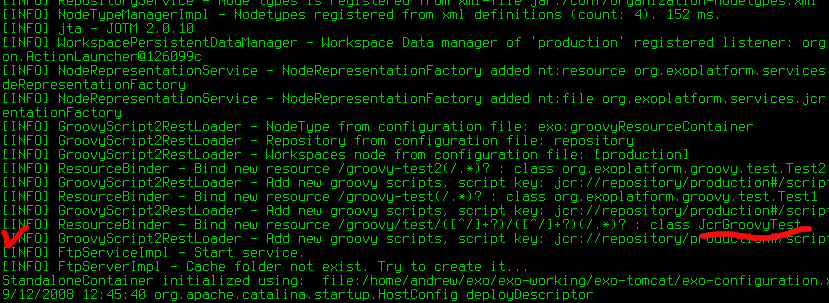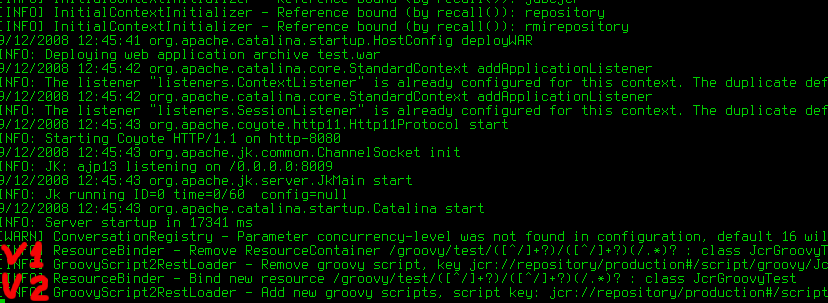This article describes how to use Groovy scripts as REST services. We are going to consider these operations:
Load script and save it in JCR.
Instantiate script
Deploy newly created Class as RESTful service.
Script Lifecycle Management.
And finally we will discover simple example which can get JCR node UUID
In this article, we consider RESTful service compatible with JSR-311 specification. Currently last feature available in version 1.11-SNAPSHOT of JCR, 2.0-SNAPSHOT of WS and version 2.1.4-SNAPSHOT of core.
There are two ways to save a script in JCR. The first way is to save it at server startup time by using configuration.xml and the second way is to upload the script via HTTP.
Load script at startup time
This way can be used for load prepared scripts, to use this way. we must configure org.exoplatform.services.jcr.ext.script.groovy.GroovyScript2RestLoaderPlugin. This is simple configuration example.
<external-component-plugins>
<target-component>org.exoplatform.services.jcr.ext.script.groovy.GroovyScript2RestLoader</target-component>
<component-plugin>
<name>test</name>
<set-method>addPlugin</set-method>
<type>org.exoplatform.services.jcr.ext.script.groovy.GroovyScript2RestLoaderPlugin</type>
<init-params>
<value-param>
<name>repository</name>
<value>repository</value>
</value-param>
<value-param>
<name>workspace</name>
<value>production</value>
</value-param>
<value-param>
<name>node</name>
<value>/script/groovy</value>
</value-param>
<properties-param>
<name>JcrGroovyTest.groovy</name>
<property name="autoload" value="true" />
<property name="path" value="file:/home/andrew/JcrGroovyTest.groovy" />
</properties-param>
</init-params>
</component-plugin>
</external-component-plugins>The first is value-param sets JCR repository, the second is value-param sets workspace and the third one is sets JCR node where scripts from plugin will be stored. If specified node does not exist, then it will be created. List of scripts is set by properties-params. Name of each properties-param will be used as node name for stored script, property autoload says to deploy this script at startup time, property path sets the source of script to be loaded. In this example we try to load single script from local file /home/andrew/JcrGroovyTest.groovy.
Load script via HTTP
This is samples of HTTP requests. In this example, we will upload script from file with name test.groovy.
andrew@ossl:~> curl -u root:exo \ -X POST \ -H 'Content-type:script/groovy' \ --data-binary @test.groovy \ http://localhost:8080/rest/script/groovy/add/repository/production/script/groovy/test.groovy
This example imitate sending data with HTML form ('multipart/form-data'). Parameter autoload is optional. If parameter autoload=true then script will be instantiate and deploy script immediately.
andrew@ossl:~> curl -u root:exo \ -X POST \ -F "file=@test.groovy;name=test" \ -F "autoload=true" \ http://localhost:8080/rest/script/groovy/add/repository/production/script/groovy/test1.groovy
org.exoplatform.services.script.groovy.GroovyScriptInstantiator is part of project exo.core.component.script.groovy. GroovyScriptInstantiator can load script from specified URL and parse stream that contains Groovy source code. It has possibility inject component from Container in Groovy Class constructor. Configuration example:
<component> <type>org.exoplatform.services.script.groovy.GroovyScriptInstantiator</type> </component>
To deploy script automatically at server statup time, its property exo:autoload must be set as true. org.exoplatform.services.jcr.ext.script.groovy.GroovyScript2RestLoader check JCR workspaces which were specified in configuration and deploy all auto-loadable scripts.
Example of configuration.
<component>
<type>org.exoplatform.services.jcr.ext.script.groovy.GroovyScript2RestLoader</type>
<init-params>
<object-param>
<name>observation.config</name>
<object type="org.exoplatform.services.jcr.ext.script.groovy.ObservationListenerConfiguration">
<field name="repository">
<string>repository</string>
</field>
<field name="workspaces">
<collection type="java.util.ArrayList">
<value>
<string>production</string>
</value>
</collection>
</field>
</object>
</object-param>
</init-params>
</component>In example above JCR workspace "production" will be checked for autoload scripts. At once, this workspace will be listened for changes script's source code (property jcr:data).
If GroovyScript2RestLoader configured as was decribed in the previous section, then all "autoload" scripts deployed. In the first section, we added script from file /home/andrew/JcrGroovyTest.groovy to JCR node /script/groovy/JcrGroovyTest.groovy, repository repository, workspace production. In section "Load script via HTTP", it was refered about load scripts via HTTP, there is an opportunity to manage the life cycle of script.
Undeploy script, which is alredy deployed:
andrew@ossl:~> curl -u root:exo \ -X GET \ http://localhost:8080/rest/script/groovy/load/repository/production/script/groovy/JcrGroovyTest.groovy?state=false
Then deploy it again:
andrew@ossl:~> curl -u root:exo \ -X GET \ http://localhost:8080/rest/script/groovy/load/repository/production/script/groovy/JcrGroovyTest.groovy?state=true
or even more simple:
andrew@ossl:~> curl -u root:exo \ -X GET \ http://localhost:8080/rest/script/groovy/load/repository/production/script/groovy/JcrGroovyTest.groovy
Disable scripts autoloading, NOTE it does not change current state:
andrew@ossl:~> curl -u root:exo \ -X GET \ http://localhost:8080/rest/script/groovy/repository/production/script/groovy/JcrGroovyTest.groovy/autoload?state=false
Enable it again:
andrew@ossl:~> curl -u root:exo \ -X GET \ http://localhost:8080/rest/script/groovy/autoload/repository/production/script/groovy/JcrGroovyTest.groovy?state=true
and again more simpe variant:
andrew@ossl:~> curl -u root:exo \ -X GET \ http://localhost:8080/rest/script/groovy/autoload/repository/production/script/groovy/JcrGroovyTest.groovy
Change script source code:
andrew@ossl:~> curl -u root:exo \ -X POST \ -H 'Content-type:script/groovy' \ --data-binary @JcrGroovyTest.groovy \ http://localhost:8080/rest/script/groovy/update/repository/production/script/groovy/JcrGroovyTest.groovy
This example imitates sending data with HTML form ('multipart/form-data').
andrew@ossl:~> curl -u root:exo \ -X POST \ -F "file=@JcrGroovyTest.groovy;name=test" \ http://localhost:8080/rest/script/groovy/update/repository/production/script/groovy/JcrGroovyTest.groovy
Remove script from JCR:
andrew@ossl:~> curl -u root:exo \ -X GET \ http://localhost:8080/rest/script/groovy/delete/repository/production/script/groovy/JcrGroovyTest.groovy
Now we are going to try simple example of Groovy RESTfull service. There is one limitation, even if we use groovy, we should use Java style code and decline to use dynamic types, but of course we can use it in private methods and feilds. Create file JcrGroovyTest.groovy, in this example I save it in my home directory /home/andrew/JcrGroovyTest.groovy. Then, configure GroovyScript2RestLoaderPlugin as described in section Load script at startup time.
import javax.jcr.Node
import javax.jcr.Session
import javax.ws.rs.GET
import javax.ws.rs.Path
import javax.ws.rs.PathParam
import org.exoplatform.services.jcr.RepositoryService
import org.exoplatform.services.jcr.ext.app.ThreadLocalSessionProviderService
@Path("groovy/test/{repository}/{workspace}")
public class JcrGroovyTest {
private RepositoryService repositoryService
private ThreadLocalSessionProviderService sessionProviderService
public JcrGroovyTest(RepositoryService repositoryService,
ThreadLocalSessionProviderService sessionProviderService) {
this.repositoryService = repositoryService
this.sessionProviderService = sessionProviderService
}
@GET
@Path("{path:.*}")
public String nodeUUID(@PathParam("repository") String repository,
@PathParam("workspace") String workspace,
@PathParam("path") String path) {
Session ses = null
try {
ses = sessionProviderService.getSessionProvider(null).getSession(workspace, repositoryService.getRepository(repository))
Node node = (Node) ses.getItem("/" + path)
return node.getUUID() + "\n"
} finally {
if (ses != null)
ses.logout()
}
}After configuration is done, start the server. If configuration is correct and script does not have syntax error, you should see next:

In the screenshot, we can see the service deployed.
First, create a folder via WebDAV in the repository production, folder name 'test'. Now, we can try access this service. Open another console and type command:
andrew@ossl:~> curl -u root:exo \ http://localhost:8080/rest/groovy/test/repository/production/test
Whe you try to execute this command, you should have exception, because JCR node '/test' is not referenceable and has not UUID. We can try add mixin mix:referenceable. To do this, add one more method in script. Open script from local source code /home/andrew/JcrGroovyTest.groovy, add following code and save file.
@POST
@Path("{path:.*}")
public void addReferenceableMixin(@PathParam("repository") String repository,
@PathParam("workspace") String workspace,
@PathParam("path") String path) {
Session ses = null
try {
ses = sessionProviderService.getSessionProvider(null).getSession(workspace, repositoryService.getRepository(repository))
Node node = (Node) ses.getItem("/" + path)
node.addMixin("mix:referenceable")
ses.save()
} finally {
if (ses != null)
ses.logout()
}
}Now we can try to change script deployed on the server without server restart. Type in console next command:
andrew@ossl:~> curl -i -v -u root:exo \ -X POST \ --data-binary @JcrGroovyTest.groovy \ -H 'Content-type:script/groovy' \ http://localhost:8080/rest/script/groovy/update/repository/production/script/groovy/JcrGroovyTest.groovy
Node '/script/groovy/JcrGroovyTest.groovy' has property exo:autoload=true so script will be re-deployed automatically when script source code changed.

Script was redeployed, now try to access a newly created method.
andrew@ossl:~> curl -u root:exo \ -X POST \ http://localhost:8080/rest/groovy/test/repository/production/test
Method excution should be quiet, without output, traces, etc. Then we can try again get node UUID.
andrew@ossl:~> curl -u root:exo \ http://localhost:8080/rest/groovy/test/repository/production/test 1b8c88d37f0000020084433d3af4941f
Node UUID: 1b8c88d37f0000020084433d3af4941f
We don't need this scripts any more, so remove it from JCR.
andrew@ossl:~> curl -u root:exo \ http://localhost:8080/rest/script/groovy/delete/repository/production/script/groovy/JcrGroovyTest.groovy

You should keep one class per one groovy file. The same actually for interface and it implementation. It's limitation of groovy parser that does not have type Class[] parseClass(InputStream) or Collection parseClass(InputStream) but only Class parseClass(InputStream) instead.
That is all.